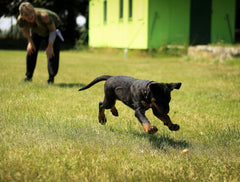
If you have a dog, you've likely worried at least once in the past about losing them. When your pet goes out to play, they might find their way on to a path that is unknown to you. Or your dog could escape from the back yard without you noticing. These scenarios are not exactly common, but if they did happen, they'd undoubtedly be scary! You'd want to know where your beloved furry friend is so that way you could find them as soon as possible!
Fortunately, ingenious manufacturers recognized that we now have the technology to find your four-legged friend anywhere in the world. Many companies produce dog GPS trackers like collars that track where your dog is at all times.
A GPS Collar Has Many Benefits
A GPS collar does what you might expect - it uses a combination of GPS dog tag and wifi or cellular technology to track where your dog is and enable you to find him or her. It works similar to the "find my phone" feature that many current smartphones have. Except that in this case, instead of locating your phone, you're tracing your pet! GPS collars are reasonably lightweight and shouldn't bother your pet. They come in two primary versions, and the first variant has GPS and wifi only. This version will connect to your home wifi network and let you know where your dog is, provided, of course, that they are within your home wifi's network range. Once they go out of that range, you won't know where your four-legged friend is. There's a second variant, though, that has GPS and cellular data. It can track your dog and send the information back to your phone so long as it can connect to cell towers.
In most cities and rural areas, this means that you can see precisely where your pet is in most places. For most people, the GPS with cellular version is most useful. The less-obvious benefit of these collars is that they also enable geofencing. Many of these collars come with apps that allow you to draw an area that your dog can be in at any given time. If they leave the designated area, you can have a notification sent immediately to your phone.
For example, let's say your dog should be in your back yard. You can open the app and draw the location of your back yard. Then, if somehow your dog leaves that area you drew, you'll get a notification immediately so you can start searching for your dog! Or, if you are at a coffee shop and leave your dog outside, you can plug the area into the app, and if they somehow get loose and start running down the street, you'll know!
GPS Collars Enable You To Find Your Dog Anywhere In The World
Accidents happen. Because of this, there's always a slight chance that your dog might get on the loose when you least expect it. If you want to protect against this, consider getting your furry friend an animal GPS tracking collar. That way, you'll have peace of mind that they are always where they are supposed to be!
Are GPS dog collars dangerous?
What range do GPS pet collars have?
How do GPS collars work?
Check out our blog and follow me on LinkedIn to stay up-to-date!




